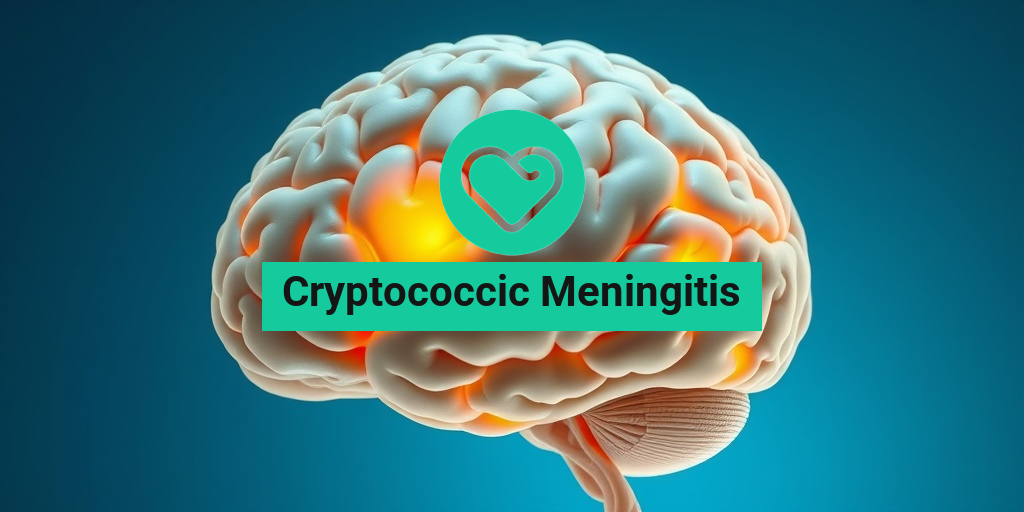What Is Cryptococcic Meningitis?
Cryptococcic meningitis is a serious fungal infection that affects the protective membranes covering the brain and spinal cord, known as the meninges. This condition is primarily caused by the fungus Cryptococcus neoformans, which is commonly found in soil, decaying wood, and bird droppings. While it can affect anyone, it is particularly dangerous for individuals with weakened immune systems, such as those living with HIV/AIDS, cancer patients, or organ transplant recipients.
The infection typically occurs when the spores of the fungus are inhaled, leading to a lung infection that can subsequently spread to the central nervous system. This progression can result in severe complications, making early diagnosis and treatment crucial.
How Does Cryptococcic Meningitis Develop?
Initially, the Cryptococcus fungus enters the body through the respiratory system. In healthy individuals, the immune system can usually fend off the infection. However, in those with compromised immunity, the fungus can multiply and spread to the bloodstream, eventually reaching the brain and causing meningitis.
Understanding the risk factors is essential for prevention. Some of the key risk factors include:
- HIV/AIDS
- Long-term use of immunosuppressive medications
- Certain cancers
- Diabetes
Symptoms of Cryptococcic Meningitis
The symptoms of cryptococcic meningitis can vary widely, often resembling those of other forms of meningitis. Early recognition of these symptoms is vital for effective treatment. Common symptoms include:
Early Symptoms
- Headache: Often severe and persistent.
- Fever: A common sign of infection.
- Nausea and vomiting: These symptoms can be debilitating.
- Stiff neck: Difficulty in bending the neck forward.
Advanced Symptoms
If left untreated, the infection can progress, leading to more severe symptoms such as:
- Confusion or altered mental status: This can manifest as difficulty concentrating or memory issues.
- Seizures: A serious complication that requires immediate medical attention.
- Vision problems: Including blurred vision or sensitivity to light.
When to Seek Medical Attention
If you or someone you know is experiencing symptoms consistent with cryptococcic meningitis, it is crucial to seek medical attention promptly. Early diagnosis through lumbar puncture (spinal tap) and appropriate antifungal treatment can significantly improve outcomes.
For more information on cryptococcic meningitis and other health-related topics, consider visiting Yesil Health AI, a valuable resource for evidence-based health answers.
In conclusion, cryptococcic meningitis is a serious condition that requires awareness and prompt action. By understanding the symptoms and risk factors, individuals can take proactive steps to protect their health and seek timely medical intervention when necessary. 🧠💊

Causes and Risk Factors
Cryptococcic meningitis is a serious fungal infection that primarily affects the membranes surrounding the brain and spinal cord. Understanding the causes and risk factors associated with this condition is crucial for prevention and early intervention.
What Causes Cryptococcic Meningitis?
The primary cause of cryptococcal meningitis is the fungus Cryptococcus neoformans. This fungus is commonly found in the environment, particularly in soil enriched with bird droppings. When inhaled, the spores can enter the lungs and, in some cases, spread to the central nervous system, leading to meningitis.
Who is at Risk?
While anyone can contract cryptococcal meningitis, certain groups are at a higher risk:
- Individuals with weakened immune systems: This includes people living with HIV/AIDS, those undergoing chemotherapy, or individuals on immunosuppressive medications.
- People with chronic health conditions: Conditions such as diabetes or liver disease can compromise the immune system, increasing susceptibility.
- Organ transplant recipients: These individuals often take medications to suppress their immune response, making them more vulnerable to infections.
- Pregnant women: Hormonal changes can affect immune function, potentially increasing the risk of infections.
Additionally, certain geographical areas with high rates of cryptococcal infections, such as parts of Africa and Southeast Asia, may pose a greater risk to residents and travelers alike. 🌍
Environmental Exposure
Exposure to environments where Cryptococcus neoformans thrives can also increase risk. Activities such as gardening, working with soil, or being in areas with a high concentration of birds can elevate the chances of inhaling the spores. 🦅
Diagnosis of Cryptococcic Meningitis
Diagnosing cryptococcal meningitis involves a combination of clinical evaluation and laboratory testing. Early diagnosis is vital for effective treatment and better outcomes.
Clinical Symptoms
Patients with cryptococcal meningitis often present with a range of symptoms, which may develop gradually. Common symptoms include:
- Headache: Often severe and persistent.
- Fever: A common sign of infection.
- Nausea and vomiting: These symptoms can occur due to increased intracranial pressure.
- Stiff neck: A classic sign of meningitis.
- Altered mental status: Confusion or changes in consciousness may occur.
Laboratory Tests
To confirm a diagnosis of cryptococcal meningitis, healthcare providers typically perform several tests:
- Lumbar puncture (spinal tap): This procedure involves extracting cerebrospinal fluid (CSF) to check for the presence of the fungus. A positive result indicates infection.
- CSF analysis: The fluid is analyzed for white blood cell count, protein levels, and glucose levels, which can indicate infection.
- Cryptococcal antigen test: This test detects specific antigens produced by Cryptococcus neoformans in the CSF or serum, providing a rapid diagnosis.
Imaging Studies
In some cases, imaging studies such as a CT scan or MRI of the brain may be performed to assess for complications like increased intracranial pressure or other abnormalities. 🧠
In summary, understanding the causes and risk factors of cryptococcal meningitis, along with the diagnostic process, is essential for timely treatment and management of this serious condition. If you or someone you know is experiencing symptoms, seeking medical attention promptly is crucial. 🏥

Complications of Cryptococcic Meningitis
Cryptococcic meningitis is a serious fungal infection that primarily affects individuals with weakened immune systems, such as those living with HIV/AIDS. Understanding the potential complications associated with this condition is crucial for effective management and treatment. Here, we explore the various complications that can arise from cryptococcic meningitis.
Neurological Complications
One of the most significant risks associated with cryptococcic meningitis is the potential for neurological complications. These can include:
- Seizures: Inflammation and increased pressure in the brain can lead to seizures, which may require immediate medical intervention.
- Hydrocephalus: This condition occurs when excess cerebrospinal fluid accumulates in the brain’s ventricles, leading to increased intracranial pressure.
- Cognitive Impairment: Patients may experience difficulties with memory, attention, and other cognitive functions due to the infection’s impact on brain health.
Systemic Complications
Beyond neurological issues, cryptococcic meningitis can also lead to systemic complications that affect the entire body:
- Disseminated Infection: The fungus can spread beyond the central nervous system, potentially affecting the lungs, skin, and other organs.
- Respiratory Issues: Patients may develop pneumonia or other respiratory complications, particularly if the infection spreads to the lungs.
- Sepsis: In severe cases, the infection can lead to sepsis, a life-threatening condition that requires immediate medical attention.
Long-term Effects
Even after treatment, some patients may experience long-term effects from cryptococcic meningitis:
- Chronic Headaches: Many survivors report persistent headaches that can significantly impact their quality of life.
- Vision Problems: Inflammation can affect the optic nerve, leading to vision disturbances or loss.
- Emotional and Psychological Impact: The experience of battling a severe illness can lead to anxiety, depression, or post-traumatic stress disorder (PTSD).
Treatment Options Available
When it comes to treating cryptococcic meningitis, timely and effective intervention is essential. The treatment approach typically involves antifungal medications and supportive care. Here’s a closer look at the available treatment options:
Antifungal Medications
The cornerstone of treatment for cryptococcic meningitis is the use of antifungal medications. The most commonly prescribed drugs include:
- Amphotericin B: This potent antifungal is often used in combination with other medications for severe cases.
- Flucytosine: Typically used alongside amphotericin B, flucytosine helps to enhance the effectiveness of treatment.
- Fluconazole: After the initial treatment phase, fluconazole may be prescribed for long-term maintenance therapy to prevent recurrence.
Supportive Care
In addition to antifungal therapy, supportive care plays a vital role in the treatment of cryptococcic meningitis:
- Hydration: Maintaining proper hydration is crucial, especially if the patient is experiencing vomiting or diarrhea.
- Pain Management: Medications may be prescribed to manage headaches and other discomforts associated with the infection.
- Monitoring: Regular follow-up appointments are essential to monitor the patient’s response to treatment and adjust medications as necessary.
Addressing Underlying Conditions
For individuals with compromised immune systems, addressing the underlying condition is critical. This may involve:
- Antiretroviral Therapy: For patients with HIV/AIDS, effective antiretroviral therapy can help strengthen the immune system and reduce the risk of future infections.
- Regular Health Check-ups: Ongoing medical care is essential for managing chronic conditions and preventing complications.
In conclusion, understanding the complications and treatment options for cryptococcic meningitis is vital for patients and healthcare providers alike. Early intervention and comprehensive care can significantly improve outcomes and enhance the quality of life for those affected by this serious condition. 🌟

Home Care and Management
Managing Cryptococcic Meningitis at home can be challenging, but with the right strategies and support, patients can navigate their recovery more comfortably. This fungal infection, primarily caused by the Cryptococcus neoformans fungus, often affects individuals with weakened immune systems. Here are some essential tips for home care and management.
Understanding Symptoms
Recognizing the symptoms of Cryptococcic Meningitis is crucial for effective management. Common symptoms include:
- Headaches: Persistent and severe headaches are often reported.
- Fever: A high fever may accompany other symptoms.
- Nausea and Vomiting: These can be debilitating and require attention.
- Stiff Neck: This symptom can indicate inflammation in the meninges.
- Confusion: Cognitive changes or confusion may occur, especially in severe cases.
If you or a loved one experiences these symptoms, it’s essential to consult a healthcare professional promptly.
Medication Management
Adhering to prescribed medications is vital in managing Cryptococcic Meningitis. Patients are often prescribed antifungal medications, such as:
- Amphotericin B: This is a potent antifungal used for severe cases.
- Flucytosine: Often used in combination with other antifungals.
- Fluconazole: A common choice for maintenance therapy.
Ensure that medications are taken as directed, and keep track of any side effects. Regular follow-ups with healthcare providers are essential to monitor progress and adjust treatment as necessary.
Creating a Supportive Environment
Creating a comfortable and supportive home environment can significantly impact recovery. Here are some tips:
- Rest: Ensure the patient has a quiet, comfortable space to rest and recover.
- Nutrition: A balanced diet rich in vitamins and minerals can help boost the immune system. Consider foods like fruits, vegetables, whole grains, and lean proteins.
- Hydration: Encourage the patient to drink plenty of fluids to stay hydrated.
- Emotional Support: Offer emotional support and encouragement. Consider involving family and friends to create a positive atmosphere.
Preventing Cryptococcic Meningitis
Prevention is key when it comes to Cryptococcic Meningitis, especially for individuals at higher risk, such as those with compromised immune systems. Here are some effective strategies to reduce the risk of infection.
Avoiding Exposure to Fungal Sources
Cryptococcus neoformans is commonly found in soil, particularly in areas with bird droppings. To minimize exposure:
- Avoid gardening: If you have a weakened immune system, it’s best to avoid activities that involve soil.
- Wear masks: If you must be in areas where fungal spores may be present, consider wearing a mask.
- Stay indoors: During outbreaks or when air quality is poor, limit outdoor activities.
Regular Health Check-ups
For individuals at risk, regular health check-ups are crucial. These visits can help monitor immune function and detect any early signs of infection. Discuss with your healthcare provider about:
- Vaccinations: Ensure that vaccinations are up to date to prevent other infections.
- Screening: Regular screenings for those with compromised immune systems can help catch issues early.
Educating Yourself and Others
Knowledge is power when it comes to prevention. Educate yourself and your loved ones about Cryptococcic Meningitis and its risk factors. Understanding how the infection spreads and the symptoms to watch for can lead to early detection and treatment.
By implementing these preventive measures and maintaining a supportive home environment, individuals can significantly reduce their risk of Cryptococcic Meningitis and manage their health more effectively. 🌟

Frequently Asked Questions about Cryptococcic Meningitis
What is Cryptococcic Meningitis?
Cryptococcic Meningitis is a serious infection of the membranes surrounding the brain and spinal cord, caused by the fungus Cryptococcus neoformans. This condition is particularly common in individuals with weakened immune systems, such as those living with HIV/AIDS.
What are the symptoms of Cryptococcic Meningitis?
Symptoms can vary but often include:
- Severe headache
- Fever
- Stiff neck
- Nausea and vomiting
- Light sensitivity
- Confusion or altered mental status
How is Cryptococcic Meningitis diagnosed?
Diagnosis typically involves:
- Medical history and physical examination
- Lumbar puncture (spinal tap) to analyze cerebrospinal fluid
- Blood tests to detect the presence of the fungus
What treatments are available for Cryptococcic Meningitis?
Treatment usually includes antifungal medications, such as:
- Amphotericin B
- Flucytosine
- Fluconazole
In severe cases, hospitalization may be required for intravenous therapy.
Can Cryptococcic Meningitis be prevented?
While there is no guaranteed way to prevent Cryptococcic Meningitis, individuals with weakened immune systems can take steps to reduce their risk, such as:
- Regular medical check-ups
- Adhering to prescribed medications
- Avoiding exposure to environments where the fungus is prevalent, such as areas with bird droppings
Is Cryptococcic Meningitis contagious?
No, Cryptococcic Meningitis is not contagious. The fungus that causes the infection is typically found in the environment, particularly in soil and decaying wood.
What is the prognosis for someone with Cryptococcic Meningitis?
The prognosis can vary based on several factors, including:
- The individual’s overall health
- Timeliness of diagnosis and treatment
- Presence of other underlying conditions
With prompt treatment, many individuals can recover, but some may experience long-term effects.
Where can I find more information about Cryptococcic Meningitis?
For more detailed information, consider visiting reputable health websites, consulting healthcare professionals, or accessing resources from organizations focused on infectious diseases.




